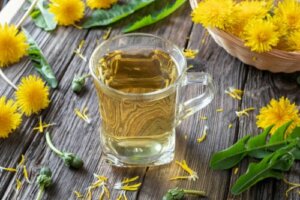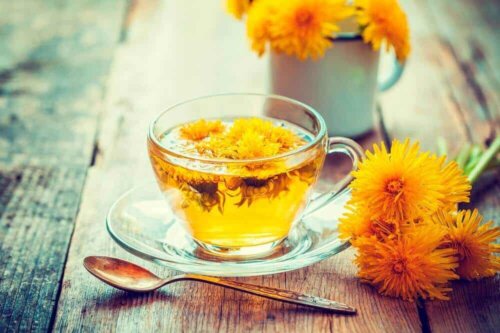Contraindications and Side Effects of Dandelion


Written and verified by the doctor Leonardo Biolatto
Dandelion (Taraxacum officinale) is safe for most healthy people when used in moderation. However, there are some contraindications and side effects to keep in mind, just as with any other medicinal plant.
The general recommendation before using dandelion, be it in tablets, extracts or leaves, is to consult a doctor. Especially if you’re undergoing pharmacological treatment or if you have a specific condition.
Continue reading to find out who shouldn’t use it.
What is a dandelion?
The scientific name of this plant is Taraxacum officinale. It has many applications in gastronomy and medicine. Part of the Asteraceae family, people cultivate and produce it predominantly in Bulgaria, Romania, Hungary, and Poland. At least according to information published in the American Journal of Botany.
There’s no evidence to support its use as a first-line treatment against diseases yet but some research findings do confirm its pharmacological properties. In addition, according to data from Precision Nutrition’s Encyclopedia of Food, a 55-gram serving of chopped dandelion leaves contains:
- 25 calories
- 1.5 g protein
- 0.4 g fat
- 5.1 g carbohydrate
- 1.9 g fiber
- 0.4 g sugar
- Vitamin A, folic acid, vitamin K and vitamin C (in its raw form)
- Calcium and potassium
The plant is usually utilized in infusion and salads and it’s also available in extracts and supplements. The latter must be used with caution and always under the supervision of a physician.

Find out more about Dandelion and Why It’s Good for Your Liver
Contraindications of dandelion
Both the dandelion root and the leaves are generally safe when used in the right doses. Furthermore, it’s important to know its contraindications. Information compiled by WebMD states that such cases include:
- Pregnancy and breastfeeding. There are no studies to confirm the safe intake of dandelion at these stages so its consumption isn’t recommended.
- Eczema. Patients with this skin disease seem to be more prone to allergic reactions to dandelion. Thus, consult a doctor before using it.
- Bleeding disorders. People who have any of these should skip dandelion as it may increase the risk of bruising by slowing down blood clotting.
- Ragweed allergy. This and other allergies to daisies or chrysanthemums alert to a possible risk of being allergic to dandelion. There’s contradictory information on the matter so it’s better to abstain from its consumption and consult a physician.
- Kidney failure. Dandelion may increase the risk of kidney complications as it decreases the number of oxalates released through the urine.
- Drug interaction. Anyone undergoing pharmacological treatment must skip dandelion due to its interaction with certain medications. According to the aforementioned source, it may decrease the effectiveness of some antibiotics, such as ciprofloxacin and norfloxacin. In addition, it may reduce the speed at which the liver breaks down some drugs, increasing the risk of side effects.

Side effects of dandelion
These are rare in healthy adults who use this plant in moderation. When they occur is usually either due to its excessive consumption or because the person has an allergic reaction to this plant.
According to a publication in the National Library of Medicine, such effects include diarrhea and gastrointestinal discomfort, heartburn, gas, and pain. It can also cause allergies that manifest with symptoms such as itching, itchy eyes, dry mouth, or excess saliva.
Read about this Dandelion Home Remedy for Bone Health
How to avoid side effects
Finally, it’s important to adhere to the recommended amount of dandelion to avoid its side effects. Don’t drink more than three cups of an infusion per day — each cup made with a teaspoon of the plant. In the case of supplements, strictly follow the recommendations of the physician or product label.
There’s not enough scientific information on the safe use of dandelion so be moderate in its consumption yet. In addition, keep in mind its contraindications and be wary of any side effects.
Find out more about this plant in the suggested article below.
All cited sources were thoroughly reviewed by our team to ensure their quality, reliability, currency, and validity. The bibliography of this article was considered reliable and of academic or scientific accuracy.
- Akhtar, U., Wankhade, A., Vyas, J., & Paithankar, V. (2023). A review on: Phytoconstituents, traditional and medicinal uses of Taraxacum offinale (Dandelion). Research Journal of Pharmacognosy and Phytochemistry, 15(2), 139-144. https://www.indianjournals.com/ijor.aspx?target=ijor:rjpp&volume=15&issue=2&article=007
- Faria, T., Nascimento, C., De Vasconcelos, S., & Stephens, P. (2019). Literature review on the biological effects of Taraxacum officinale plant in therapy. Asian Journal of Pharmaceutical Research and Development, 7(3), 94-99. http://ajprd.com/index.php/journal/article/view/502
- Lis, B., Rolnik, A., Jedrejek, D., Soluch, A., Stochmal, A., & Olas, B. (2019). Dandelion (Taraxacum officinale L.) root components exhibit anti-oxidative and antiplatelet action in an in vitro study. Journal of Functional Foods, 59, 16-24. https://www.sciencedirect.com/science/article/abs/pii/S1756464619302750
- Montagnani, C., Gentili, R., & Citterio, S. (2023). Ragweed is in the air: Ambrosia L.(Asteraceae) and pollen allergens in a changing world. Current Protein and Peptide Science, 24(1), 98-111. https://www.ingentaconnect.com/content/ben/cpps/2023/00000024/00000001/art00011
- Zanatta, M., Miorando, D., Stefller, A., Roos, N., Ernetti, J., Predebon, A., Lindemann, H., Mânica, A., Oliveira, B., Serpa, P., Bohnen, L., Simomura, V., Gomes, D., Vidal-Gutiérrez, M., Vilegas, W., Silva, L., & Roman, W. (2021). Gastroprotective effects of the aqueous extract from Taraxacum officinale in rats using ultrasound, histology, and biochemical analysis. Evidence‐Based Complementary and Alternative Medicine, 2021(1), 8987232. https://onlinelibrary.wiley.com/doi/full/10.1155/2021/8987232
This text is provided for informational purposes only and does not replace consultation with a professional. If in doubt, consult your specialist.








